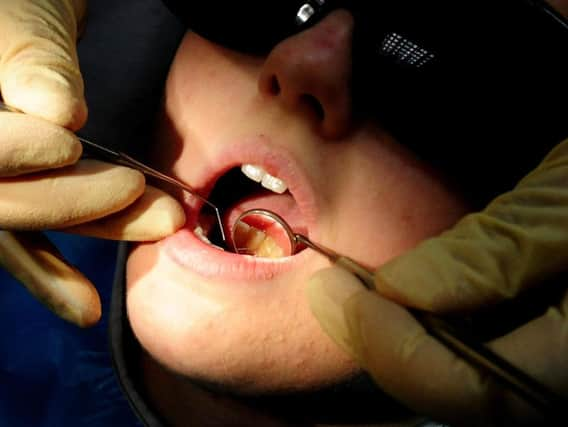Young South Tyneside children best in the UK for seeing the dentist, research reveals as experts raise fears over tooth decay


Analysis of NHS Digital data for England found most children miss out on dental appointments in the first few years of their lives, putting them at risk of tooth decay.
The NHS recommends parents take their children to the dentist when their first milk teeth appear, with regular check-ups to follow.
Advertisement
Hide AdAdvertisement
Hide AdBut just 3% of children nationally visit the dentist before their first birthday, rising to 12% by the age of two, according to a new study.
However, children under one in South Tyneside are the best attenders in the UK, with 12.3% of youngsters in that category visiting the dentist - despite it being one of the most deprived local authorities in England.
One of the lowest rates of dental attendance for children aged under one was in West Berkshire - less than 1% - but deprivation in the area is ranked low.
The new study was carried out by the University of Birmingham in collaboration with the University of Edinburgh and Public Health England.
Advertisement
Hide AdAdvertisement
Hide AdThe researchers were surprised to find that children from deprived backgrounds were more likely to attend check-ups than their wealthier counterparts.
Lead author Candy Salomon-Ibarra, from the University of Birmingham, said: "Our findings were unexpected as we had anticipated seeing higher levels of attendance in more affluent local authorities, but this was not the case.
"We explored with private dentistry providers whether children were being seen privately instead, but this does not seem to be the explanation.
"More studies are needed to explore the reasons for such variations in rates of dental visits, such as a lack of local initiatives to encourage attendance or difficulties accessing NHS care.
Advertisement
Hide AdAdvertisement
Hide Ad"The fact that so few children nationally under the age of two attend the dentist, no matter where they live or their economic circumstances, shows that policymakers face enormous challenge attempting to improve this situation."
Dr John Morris, senior lecturer in dental public health at the University of Birmingham, said: "Early dental visits not only provide parents with information they require to prevent early childhood oral health issues, but it is also believed that such dental visits familiarise children with the dental environment and reduce future dental anxiety.
"Poor oral health can cause pain and infection, which can affect eating, sleeping, socialising and learning, yet worryingly our research suggests that there is a widespread lack of understanding of the importance of taking children to the dentist before their first birthday."
The research found the NHS spends around £3.4 billion per year on dental services.
Advertisement
Hide AdAdvertisement
Hide AdIn the two years to March 2016, tooth extraction was the main reason for hospital admission in five to nine-year-olds and the sixth most common procedure in those aged under five.
The British Dental Association (BDA) said successive governments have failed to offer a "joined-up" approach to children's dental health.
Chairman Mick Armstrong said: "Tooth decay is the number one reason young children will end up in hospital, and it won't be solved with token efforts."
The research was published in the journal Community Dental Health.